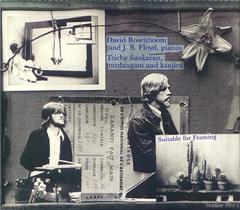DAVID ROSENBOOM, JB FLOYD & TRICHY SANKARAN / Suitable for Framing
David Rosenboom (piano); JB Floyd (piano); Trichy Sankaran (mrdangam & kanjira)
On April 19th, 1975, at Northern Illinois University, three musicians met in a milestone event from which emerged a unique, improvising trio with two pianos and South Indian percussion. Fortunately, it was recorded and excerpts released on a long out of print LP. This CD recaptures the essential essence of the entire evening of musical discovery with previously unreleased music recovered from digitally reprocessed tapes recently discovered in diverse states of preservation.
TRACK LIST
19IV75 (22:37)
Patterns for London (Movement 1) (9:15)
Mrdangam Solo (9:47)
Is Art Is (21:15)
Suitable Bonus (9:18)
REVIEWS
At Northern Illinois University on 19th April 1975 a remarkable concert took place featuring the twinned pianos of composers David Rosenboom and JB Floyd with added magic from South Indian percussionist Trichy Sankaran. It was documented on a painfully scarce LP issued by the Aesthetics Research Centre Of Canada. Now Suitable For Framing has resurfaced with additional material and it’s still a mesmerizing experience. The vinyl release carried the subtitle “forms of freedom for two pianos and mrdangam”. This was one of those incandescent moments that marked a confluence of energies released through experimental composition in the wake of Cage, Coltrane’s spiritual sublimation of jazz technique and exploratory, horizon-expanding engagement with non-European music.
The longest track, “19IV75”, is a 22-minute billowing keyboard duet, structured improvising that swirls and breaks around transitory compositional touchstones. These aids to navigation had been acquired during the preceding year through a series of concerts across Europe and North America and in accompanying Merce Cunningham’s dancers. Cues emerge spontaneously in the flux, are used and superseded in a musical outpouring that’s transporting and at times torrential.
The first movement of Rosenboom’s tripartite “Patterns For London” was written for performance at London’s 1972 International Carnival Of Experimental Sound. The pianists improvise around ostinato chords and modal scales that circulate within a potentially endless cyclical form. A dazzling ten-minute percussion solo follows. It wasn’t included on the vinyl issue but clarifies helpfully an affinity between the aspirations of the two Americans and the dynamic tradition nourishing Sankaran. Rosenboom’s “Is Art Is” is another 20-minute track, now longer by a third than the LP version. It was written initially for Floyd’s group Electric Stereopticon and involves further engagement with infinite form, phased repetition and overlapping themes wound into an ecstatic proliferation of jazz-tinged minimalism, magnificently glossed by Sankaran’s drumming. “Suitable Bonus”, the concluding extra track, is improvised around a couple of Rosenboom’s compositions with Sankaran playing kanjira, a kind of tambourine. It resoundingly confirms the spirit of the occasion and puts the seal on a vital and thoroughly uplifting recording.
Dan Warburton, Paris Transatlantic Magazine
Originally released on a now long out-of-print LP, this album documents an evening of music recorded at Northern Illinois University on April 19th 1975, when pianists / composers David Rosenboom and JB Floyd crossed swords with Indian mrdangam vidwan virtuoso Trichy Sankaran for what the press release boldly describes as a "milestone event" (though one wonders how many more similar milestone crossover encounters that decade went unrecorded). "Structured improvisation" might be the best way to describe the pianists' work, based as it is partly on existing compositions and having more in common with the work of Reich and Riley and, standing in their shadows, Stravinsky and Bartók than with the free improvisation of the period. Both approach the pianos with rampant grad student enthusiasm, firing volleys of clusters across striding motoric ostinati - the old Cecil Taylor line about "88 tuned drums" has never been appropriate.
Sankaran's percussion work is crystal clear and beautifully paced on its own on the solo third track, but it's quickly swamped by the pianists' testosterone-fuelled Petrushka-on-speed comping (whomping, more like) of "Is Art Is". For all its muscular bravura, the music tends to fall back all too easily on time-honoured formal patterns of climax and decay; however, if period poly-keyboard pieces like Reich's "Six Pianos" have always seemed too cool and calculating for you, this is probably right up your street. The "Suitable Bonus" track can't get more explicit than that as far as titles go is earnestly energetic and sweaty, but despite all its exuberant fisticuffs remains firmly trapped in its 15/8 prison.

